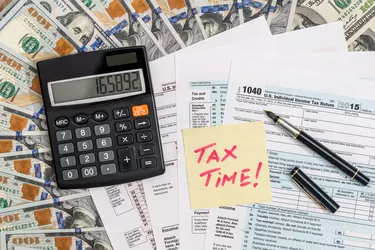
Taxes amount to one of the largest yearly expenses for the average American family. Taxes affect all kinds of financial transactions, such as income, capital gains, inheritance, sales of goods and services and imports. Taxation is a controversial topic; for every proponent of higher taxation you'll find an opponent who does not want to give more money to the government than necessary.
Public Goods
Video of the Day
Taxes are necessary for a government to run. Without taxes, a government would not be able to hire employees or pay for any social programs. Money from taxes pay for infrastructure such as roads, water systems, parks and public transportation. Social programs such as Social Security, Medicaid and Medicare would not be possible without taxes.
Video of the Day
Wasteful Spending
Taxes are essential for basic government operations, but oftentimes tax dollars are channeled into areas that some may consider wasteful or unnecessary. Politicians have a vested interest in pandering to their constituents, which can lead to wasteful spending. For instance, a senator from Alaska might try to secure millions in federal tax dollars for research on oil reserves or wildlife in Alaska because the money would help his state -- depriving other states who need the funds for their own needs. In addition, defense spending and spending on homeland security would not be possible without taxation. Defense spending is a controversial topic; some consider defense spending to be excessive, such as those opposed to the wars in Iraq and Afghanistan.
Economic Impacts
Increased taxation tends to discourage economic activity and limit economic growth. The higher taxes are, the less money citizens will have to spend on goods and services and lower consumption leads to less revenue for business. When businesses make less money, they hire fewer workers and may fire workers to maintain profitability. Governments often pass tax cuts or give out tax refunds in periods of economic hardship to spark economic activity, though tax cuts can those who rely on public programs like Social Security and infrastructure spending.
Shaping Behavior
Taxation is has the power to shape or limit certain behaviors. When the government taxes a certain product or service, such as cigarettes, alcohol or tanning salons, it places a disincentive on purchasing the product or service. Taxation, therefore, can be used as a weapon against activities that are considered harmful, such as smoking and drinking.